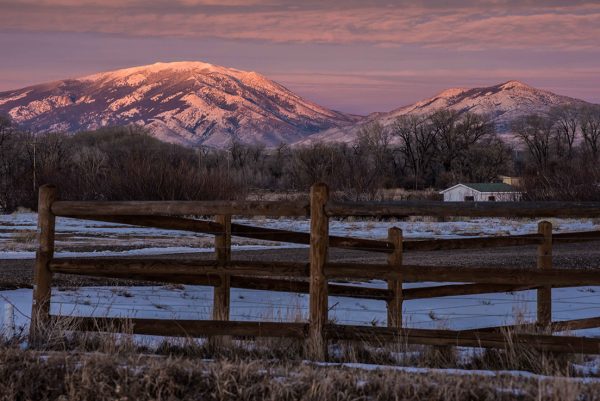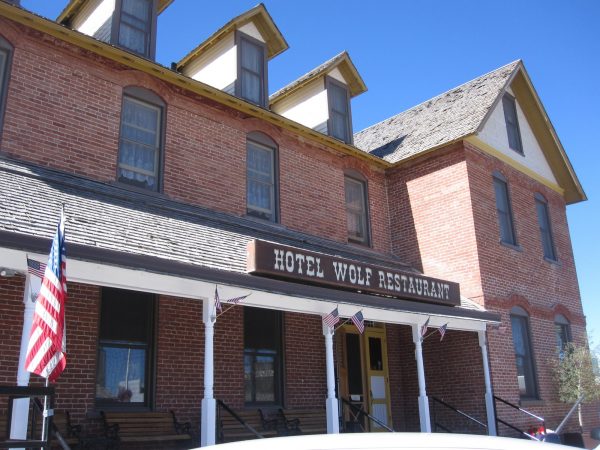Eating Popcorn in Bed
A Collaborative Reflection on a DIY Writer’s Retreat
By associate editors JV Genova and Nicole Piasecki
We steered our cars separately through the Medicine Bow-Routt National Forests, on Wyoming Highway 130—also known as Snowy Range Road—toward the historic town of Saratoga to converge for a DIY writing retreat. We, three middle-aged women writers, planned to spend four days and three nights reading and writing in a beautiful and remote setting.

We were desperate for sheltered time to write. We are all mothers of small children, teachers, editors, and MFA candidates. We are all in our mid-forties—the oldest students in our MFA program at Colorado State University. Our burgeoning friendships were born from workshops, from reading each other’s work, and an understanding of the challenges present in our daily lives that sometimes act as both fodder and impediment to our work as writers.
The view from the windows as our cars pointed west was stunning: trees aflame in fall colors, accelerated by the high subalpine elevation; the cold, still water in patches by the roadside; two-lane highway winding through the forest; and even the first signs of snow. The drive allowed for contemplation, meditation on the highway lines as they led us through the forest and past billion-year-old rock formations.
Before leaving from our respective homes in Denver, Wellington, and Fort Collins, we all set goals for our long weekend together. We were determined to make the most of every minute because getting sheltered writing time is so rare and getting out of town for three nights almost impossible. To enter into a weekend of writing without interruptions or outside distractions felt both delicious and guilt-inducing. At home, time can feel uncontrolled—or maybe a little too controlled. We’d all felt the familiar frustration of having to abandon a flow state and break artistic momentum to rush off and pick up our children from school at two thirty when the day felt like it had just begun, when we’d barely had time to eat, shower, exercise, write a few lines, check in with students, et cetera. Never mind that familiar “your kid is sniffling and must be picked up now” phone call that derails a perfectly good writing day.
We arrived at intervals in the late afternoon, and each claimed a room in the Airbnb we’d rented in town. Though we knew one another through our creative nonfiction workshop and a few social events, we’d spent hardly any time outside of class together. The night of our arrival, we met at a little Italian restaurant, where we shared a bottle of wine and bruschetta. We planned our retreat over plates of pasta and shared our goals for the coming days, enjoying food and conversation about our lives, the writing process, and our work as writers.

From the first morning and each morning after that, we fell into a surprisingly easy rhythm together. Whoever rose first made the coffee. We’d descend to the kitchen, book or laptop in hand, and in the quiet morning hours, we each began working—whether reading, journaling, or writing. We found ourselves in our own quiet places and showed a deep and abiding respect for not interrupting each other (the opposite of our home lives). The back patio often found one of us writing in the sun, while the streets surrounding the Airbnb allowed us to meander, gathering thoughts on a writing break. We each appreciated seeing multiple deer, and we all noted a family of deer resting in the green grass outside a dark gray church.
The retreat allowed us to remain immersed in our work. From waking to sleeping, we centered ourselves largely in the headspace of the art. We stayed connected to our writing over multiple days—not fleeting minutes or even a few hours. Days. Precious days.
Takeaways and Advice
Find Compatible Retreat Buddies
We found it important to retreat with people who were equally as serious about progressing on a writing project. We appreciated that the others had similar limitations in life that made the retreat feel all the more precious.
Set a Budget and Stick to It
We decided to keep our total trip budget at $500 per person, which was sufficient for Saratoga in September and included lodging, gas, groceries, and dinner. Donated lodging could make your retreat more financially accessible. You might ask friends and family if they would be willing to donate their cabin, condo, or timeshare for future retreats.
Find a Comfortable Space for Writing and Gathering
When selecting lodging, make sure there are several comfortable workspaces and adequate lighting. For us, having both private and communal spaces felt essential. We each got to have our own bedroom but also used the kitchen counter, living room, and the back patio as workspaces. We appreciated the outdoor seating for working with sunshine on our faces and fresh air. The proximity to town and walking trails made it unnecessary to drive anywhere over the four days. We walked to dinner each night and each set off on independent walks to get exercise and think about our projects during the mornings or afternoons. We may not have initially realized how important this would be, but walkability has become one of our non-negotiables for future retreats.
Being parents, it was lovely to just retire to our own rooms in the evening and establish our own bedtime routines, independent of our children’s. We could stay up late reading and even eat popcorn in bed (as one of us did) without our child saying, “That isn’t fair. I’m not allowed to eat popcorn in bed!”
Set Measurable and Achievable Goals in Advance
We set manageable goals before leaving for Saratoga and shared those goals the first night at dinner. This planning and sharing created accountability and intention. We each hit the ground running on the first morning.
Be Intentional about Transportation
Be thoughtful about carpooling. Driving together would have saved us money and gas (and would have been better for the environment). We chose to drive separately, mostly due to scheduling conflicts. Ultimately, traveling separately had unexpected benefits. The alone time and drive through the Snowy Range was meditative and allowed for much-needed transition time between our home lives and the retreat setting. This transition time and freedom to move at our own pace felt golden. We left at different times, took our time getting home, stopped at scenic pullouts on a whim, took different routes, and listened to our own audio books or podcasts as we drove back. For three women used to rushing through their lives and accommodating others’ needs, this softened the reentry.

Give Up Cooking Dinner
We decided not to cook, though early in our retreat planning we had talked about sharing cooking duties. We quickly realized the error in our thinking. This was a retreat from our daily lives.
We filled the fridge the morning after our arrival with easy, healthy foods and snacks for breakfast and midday. For dinner, we found popular local restaurants in town and allowed ourselves to simply relax after a long day of writing. The dinner meetups were an extension of the writing but also offered decompression and reflection to create closure on the day. We fell quickly into conversation about what we accomplished and how our writing went that day before sharing our personal struggles and talking (just a little) about our children. We enjoyed having a drink without worrying about driving. We each got to have the exact meal we wanted. Even though our kids weren’t there, some of us still opted for mac ’n’ cheese and fried chicken, though these versions of the dishes were chef-inspired.
Make It a Date
We plan to include quarterly retreats in our regular writing practice and will keep honing the retreat practice based on this great first experience. As middle-aged artists planning for post-MFA life, our budding writerly friendships will offer reciprocal nourishment and encouragement, a regular connection to a creative community and our in-progress work. When you’re with a group of writers who know you and your projects, you don’t have to try to explain or justify anything about your art to them. You can just sit down together at the kitchen table with a hot cup of coffee in a stunning town like Saratoga, Wyoming, and feel the collective energy and begin to write.
JV Genova is an MFA candidate in nonfiction at Colorado State University and an associate editor for Colorado Review. When she isn’t writing, she dabbles in photography and grows potatoes. She cannot believe she is someone’s mother. She can be found on Twitter @jv_genova and on Instagram @jv_genova
Nicole Piasecki is an MFA candidate in creative nonfiction at Colorado State University, an associate editor at Colorado Review, a senior instructor for the University of Colorado Denver English Department, and a consulting editor for nonfiction for Copper Nickel. Nicole’s creative writing has been featured in Literary Mama, Longreads, Hippocampus Magazine, Gertrude Press, and the Brevity blog. She is working on a collection of essays.